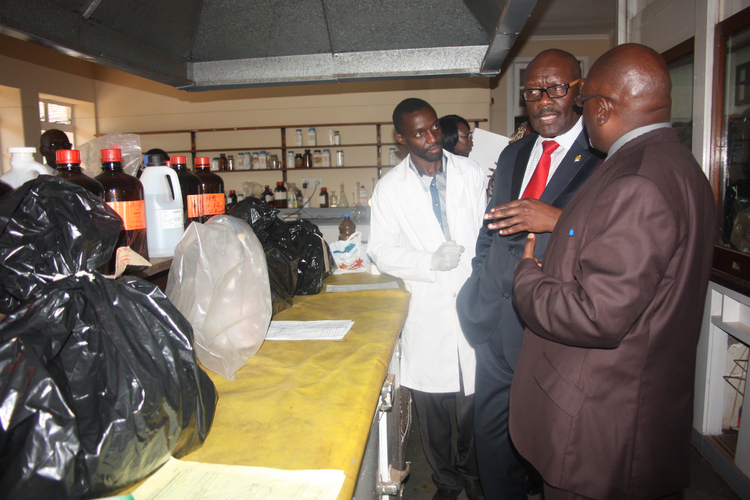
The Sunday Mail

On entering the toxicology department at the Government Analyst Laboratory in Harare, one is greeted by the smell of human body parts, this being the result of incomplete or undone post-mortems.

Minister of Health and Child Care, Dr David Parirenyatwa, touring the Government Analyst Laboratory recently
Stomachs and their contents, livers, lungs and kidneys are stashed in preservation bags. The department has run out of refrigeration space to store these samples.
The situation has been compunded by the fact that equipment required to resolve these cases has been faulty for more than a decade, whereas the laboratory has to keep samples until cases are concluded.
The Analyst Laboratory is mandated with ensuring the safety of the public health system through testing of food products (local and imported), water and post-mortems for suspicious deaths.
But it has not been able to carry its mandate fully as it has been incapacitated since 2004 when its essential equipment malfunctioned.
The norm is that machinery is replaced every five to seven years.
The Government Analyst Laboratory operates on a shoe-string budget, which director Mr Munyaradzi Musiyambiri says has crippled operations.
“We are wholly funded by Government and so far we have received only US$13 000 out of the $50 000 promised to us. Our actual requirement is around US$200 000 a year,” he said.
Unresolved post-mortems
During a recent familiarisation tour of the facility, Mr Musiyambiri said they had a post-mortem backlog of nearly 1 500 cases dating back to 2004.
Head of the toxicology and clinical department Mr Daniel Zulu added: “The backlog has led us to place some of the samples in the cupboards. Samples ranges from intestines, liver, kidneys, lungs, and sometimes food consumed by the victim.”
Unresolved cases mean the relatives of the deceased cannot make insurance claims.
Substandard foods
Many imported food products are sub-standard, posing a high health risk.
Principal laboratory technologist Mr Bernard Samendi said as much as they tested most of imported foodstuffs, they were not working at full capacity.
He cited a mince meat-like product commonly known as makanyanisi that is being imported from South Africa and Namibia as sub-standard.
“The contents of the product isn’t really known, we do know what type of meats are used to produce it. We have figured that all kinds of meat are used for its production and although we are still testing it, we can confirm that it’s really sub-standard,” he explained.
Other products the laboratory is still to test include imported drinks Twizza and Dragon.
“Dragon energy drink is a fortified product which is supposed to get a licence before being distributed to the public,” Mr Samendi said. “By the nature of its composition, it is supposed to be approved for sale to the public but this hasn’t been happening and the drink has flooded the market.”
Health and Child Care Minister Dr David Parirenyatwa, who was part of the famialirisation tour, said there was need to inform the public about dangerous foodstuffs.
“Some of the foods are carcinogenic, they can give us cancers later in life,” he said.
Opaque beer
While opaque beer is popular due to its affordability, consumers are at risk of consuming unknown foreign bodies, the Analyst Laboratory warned.
Used sanitary pads and condoms, vomit, rats and other particles have been found found in sealed opaque beer containers – and even a dead snake.
“This dead snake was discovered in opaque beer and it was not the first time that we found foreign substances,” said Mr Samendi.Whilst it is easy to blame the brewer, Mr Samendi said it was more likely that consumers were at fault.
“You will realise that consumers usually keep containers and even use them for storing other products and would only take them back when they want to claim the money they would have left at bottle stores as deposit.”
Mr Samendi added that foreign materials were hard to detect during cleaning of re-usable containers as this was done by machines and not manually.
“The consumers have a responsibility of protecting themselves. If the consumers continue to abuse these containers they remain at risk of drinking contaminated beer,” he cautioned.
Nonetheless, they are engaging brewers to improve efficiency of cleaning processes.
Fake nutritional claims
Mr Musiyambiri said routine investigations revealed that breakfast cereals, baby foods and syrups, peanut butter, cooking oil and juices were among products whose quality failed to meet satisfactory standards.
Some of these products bear unsubstantiated nutritional claims.
A local cooking oil’s label claiming it contained vitamin A supplements proved to have none when tested.
The laboratory also dismissed claims by an imported baby cereal which unscientifically claimed to boost infants’ ability to chew and talk.
Contaminated water
With regards to drinking water, Mr Musiyambiri said Harare Municipal Water had so far met required standards – but most tested boreholes were contaminated.“Water supplied by the local authorities is generally clean but our main worry lies with water sourced from boreholes and unprotected water bodies which is usually contaminated as it contains many suspended particles,” he said.
The laboratory receives water samples from local authorities and water bottling companies twice a year.
Mr Musiyambiri also raised concern about bottled water.“With bottled water, there is now a lot of cheating as people are taking labelled empty water bottles and refilling them with water that hasn’t been screened, and reselling it.
So there are a lot of dangers that we need to look out for hence this laboratory is an important outfit for the Government.”



